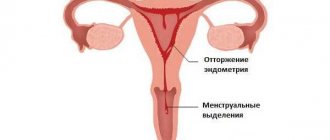It is generally accepted that a woman’s main purpose in life is to give birth and raise a child. For this, nature has provided everything necessary: one should become a mother only at an age when the body is ready for this. And the older the woman, the more difficult it is to conceive and bear a healthy baby, providing him with all the nutrients necessary for growth and development. Menopause is a kind of time interval in a woman’s biological cycle, after which the likelihood of getting pregnant decreases, and after it ends, it completely disappears. And yet, conception is possible, which every representative of the fair sex should remember.
Menopause and pregnancy: common symptoms
Menstrual cycle changes
Due to hormonal changes in the body, which can occur both during pregnancy and premenopause, the cycle changes. A missed period is the first sign of pregnancy, while irregular periods may be the first symptom of approaching menopause.
Irregular periods include changes in the amount of bleeding, its color and duration. It is very important to remember that irregular periods can indicate various pathologies in the body. Therefore, if you experience such changes, it is recommended to consult a gynecologist.
Fatigue and sleep problems
Feeling tired and having trouble sleeping can occur both during pregnancy and perimenopause. In the first case, fatigue is caused by an increase in progesterone levels, which can cause sleep problems. In the second case, everything happens the other way around: problems with sleep arise, which entails a feeling of fatigue.
Mood changes
Changes in hormonal levels entail not only changes in the menstrual cycle, but also mood swings. During pregnancy, changes are manifested by unusual emotionality and sentimentality. During perimenopause – moodiness, irritability or depression.
Headache
Headaches during pregnancy can be caused by changes in hormone levels, lack of sleep, stress, or dehydration. During menopause, discomfort caused by headaches is a consequence of decreased estrogen levels.
Weight gain
In pregnant women, body weight increases as the fetus develops. During menopause, maintaining a healthy weight becomes more difficult due to hormonal changes, the levels of progesterone, estrogen and growth hormone drop, which subsequently leads to changes in metabolic parameters and, as a result, to an increase in body weight.
Urinary incontinence
Most urinary incontinence in pregnant women occurs in the third trimester. This is due to the fact that during the process of changing the position in the uterus, the baby hits the bladder with his hand or foot, this can lead to involuntary leakage of urine in the expectant mother. During menopause, loss of urinary control can result from decreased muscle tone.
Changes in sexual desire
Hormonal changes can also affect sexual activity during both menopause and pregnancy. If in the first case the libido decreases, then in the second the libido may increase or decrease.
Bloating and abdominal cramps
In early pregnancy, you may feel uterine contractions. Changes in hormones can also cause bloating. During perimenopause, bloating and cramping may be a sign that menopause is approaching.
How are pregnancy and menopause diagnosed?
There are several methods that can be used to determine whether a woman is pregnant or going through menopause.
Diagnosing pregnancy
Ultrasound is the most effective method for determining pregnancy
If a woman suspects she is pregnant, she can use conventional tests, which are sold in any pharmacy today.
These tests count the levels of the pregnancy hormone human chorionic gonadotropin (hCG) in a woman's urine.
Typically, hCG is present in significantly higher amounts in the urine when a woman is pregnant. However, it is important to remember that this test is not 100% accurate.
To be more sure, your doctor may take a blood test to measure elevated levels of pregnancy-related hormones such as progesterone and hCG.
However, the most reliable methods for determining pregnancy in women are ultrasound and a fetal heart rate test. An ultrasound scan uses sound waves to detect the presence of a baby.
Symptoms unique to pregnancy
Increased swelling and tenderness of the breasts
A characteristic sign of the onset of pregnancy is increased sensitivity and tension in the chest. But soon the body adapts to hormonal changes and the discomfort gradually goes away.
Nausea
Morning sickness (early toxicosis) is a common syndrome in women in the first trimester of pregnancy. Although this is usually called morning sickness, the feeling of nausea can occur throughout the day. Some women may never feel sick during pregnancy.
Constipation
Changes in hormonal status during pregnancy slow down the digestive tract. This can lead to constipation.
Changing food preferences
Taste preferences may also change during pregnancy. A woman may stop eating her favorite foods or start eating foods she hasn't eaten for years. You may also experience nausea after eating certain foods or smelling them. For example, coffee, dairy products, etc.
How to distinguish menopause from pregnancy
You can recognize pregnancy during menopause in the same ways as before. This is easy for experienced women who have already given birth, but those who become pregnant for the first time may be confused, because some symptoms of pregnancy are also characteristic of menopause. They may become confused when they feel the first fetal movements during their first pregnancy at this age.
A pregnancy test during menopause is not the most reliable way, because due to hormonal changes with age, the data may be distorted. In order to find out for sure whether this is pregnancy or whether it is symptoms of menopause, it is better to visit a doctor who will confirm or refute suspicions.
Symptoms unique to menopause
Hot flashes and night sweats
The only unique symptom of menopause is hot flashes. They are accompanied by a feeling of heat in the upper body (redness of the face and chest, increased sweating and rapid heartbeat).
Bone loss
Declining estrogen levels during premenopause and menopause can lead to loss of bone density. This increases the risk of developing osteoporosis and fractures. Pregnancy does not affect bone mass density.
Signs and features
The main problem is that most of the symptoms of pregnancy are similar to those that occur during menopause. The most common signs of pregnancy with limax are:
- excessive sweating
- lack of menstruation
- emotional instability
- Bad mood
- weight gain
- headaches and dizziness
- nausea, vomiting that occurs after eating or from various odors
How can you determine that these are signs of pregnancy and not menopause? If you are pregnant, all these symptoms will be more pronounced. The body is rebuilt, hormonal levels change, and the baby immediately begins to take what it needs for normal growth and development inside the mother’s womb.
How not to confuse menopause and pregnancy: advice for women before menopause
What to fear most
06/05/2019 at 17:47,
At the end of last year, a married couple made a lot of noise in America - 50-year-old Michelle Hall and her 47-year-old husband Jerry, who have adult children and grandchildren, unexpectedly became parents. The fact is that Michelle realized that she was expecting a child only shortly before giving birth - she was sure that due to her age she was no longer able to give birth.
Doctors warn: even if a woman is on the verge of menopause, she should not relax. Otherwise, Nezhdan (as late children were called in ancient times) will unexpectedly appear when you least expect him.
Medical practice shows: it is during the premenopausal period that pregnancy behaves especially insidiously, and its symptoms can easily be mistaken for menopause. If the lady is in the body, then she may not notice anything until the fetus begins to move. Although even in this case, some women show surprising carelessness, mistaking the kicks of the unborn baby for processes in the intestines.
This is exactly the situation that happened with the mentioned American Michelle: “critical days” came to the 49-year-old woman from time to time, and she was not surprised by their absence, but Michelle mistook the growth of her abdomen and weight gain for age-related changes. Her gynecologist subsequently explained: apparently, one of the last eggs was fertilized just at the onset of menopause.
The couple did not want to terminate the “surprise pregnancy”; it proceeded without complications. In order not to risk it, the late woman in labor underwent a cesarean section, and she gave birth to a healthy boy, who was named Grayson. True, after his birth, the child was under the supervision of doctors for 12 days in the neonatal intensive care unit.
Obstetricians and gynecologists do not experience much joy when pregnancy bursts into the life of a woman on the verge of menopause. Still, this is not provided for by female physiology. General Director of the Population and Development Association, obstetrician-gynecologist, international expert in the field of reproductive health and rights Lyubov Erofeeva, just in case, reminds that the boundaries of a woman’s reproductive age are 15–45 years. Doctors consider everything below and above these limits to be a deviation from the norm that carries a risk.
“From the age of 35, the number of eggs is already decreasing, and with each subsequent year, a woman’s genetic material decreases, and the risk of genetic disorders in the fetus, including Down syndrome, on the contrary, increases,” explains Lyubov Erofeeva.
It is for these reasons that if, for example, a woman did not suspect she was pregnant, believing that she was in menopause, she has every right to terminate it even in the later stages, says the obstetrician-gynecologist. Late maternal age is already a medical indication for terminating an unwanted pregnancy.
It’s another matter if a late pregnancy is desired, if we are talking about a second, third, fourth child. Doctors take such a patient under their strict control. It is necessary to carefully monitor the condition of the mother and her unborn baby, because by this age women often already have cardiovascular diseases, liver and kidney diseases. Problems with this triad can lead to severe toxicosis, and as a result, the patient may even remain disabled. If you strictly follow all the doctors’ instructions and do timely examinations of the mother and fetus, you can minimize the risk and give birth to a healthy child even at this age!
Cases of unexpected late (by the standards of old times after 30 years) childbirth were quite common among our ancestors. According to birch bark letters, such a child was called Nezhdan. However, women in those days rarely lived to see menopause, because life expectancy was extremely low - 35–37 years. They gave birth many times, very often the birth led to the death of the woman in labor.
There have been certain periods in the history of states when there was a surge in late births. And this, alas, is connected with tragic events: women lost their sons who went off to fight. That’s when inconsolable mothers decided to give birth to another child at the age of 45–50.
Lyubov Erofeeva warns that women aged 47–48 years and older, no matter how much they wish, should under no circumstances relax. Although their likelihood of conceiving a child is already approaching zero, nevertheless, pregnancy can fall like an avalanche on their head: one of the surviving eggs may well seize on its last chance!
You can forget about the fear of unwanted pregnancy only if there have been no “critical days” for exactly a year, and doctors have confirmed that menopause has arrived. If they are absent, for example, only 11 months, you need to be alert: do not forget about using contraceptives. The best option is an IUD (intrauterine device). At the same time, it should be removed no earlier than after a year of absence of “critical days”.
By the way, if menopause has occurred, then IVF will no longer help, because in order for the pregnancy to be delayed and fully developed, an appropriate level of hormones in the woman’s body is needed.
Possible periods
It is interesting that serious hormonal changes in women over 40 years of age largely depend on the region of residence. Age can fluctuate up to 55 years, and on average around the world this figure is significantly less than 45-48 years.
Is it possible to get pregnant during menopause? Doctors say that there are 3 different periods when conception is possible during menopause and when it is not.
1st degree
During this special period, the ovaries reduce the production of the hormone estradiol and progesterone, but the synthesis of FSH is normal, which is responsible for the active growth of follicles and the formation of estrogens, which is why it is possible to become pregnant.
The initial stage of premenopause is characterized by the following symptoms:
- menstruation becomes irregular, cycle failure occurs, and long delays occur;
- feeling of a short-term rush of blood to the face;
- excessive sweating, feeling of chills;
- regular surges in blood pressure;
- pain in muscles and joints.
As a result, it turns out that during this period, without additional contraceptive measures, pregnancy during menopause is real.
2nd degree
Menstruation has not come for a long time, and reproductive function is finally completed. The main danger for a girl is that menopause lasts more than 1 year, during which conception can occur. At this time, there are about 1000 more “live” eggs in the follicles.
Therefore, doctors do not give a complete guarantee and recommend using reliable contraception. It turns out that getting pregnant during menopause is possible.
We can talk about complete dysfunction of reproductive function when there have been no periods for 1 year or more.
3rd degree
Period 3 - postmenopause lasts from 5 to 10 years after menopause. By this time, the ovaries had significantly decreased in size. Moreover, even in the first 5 years they can release a pair of small eggs. That is, the chance of getting pregnant, although minimal, is there.
At later stages of postmenopause, follicles cease to be released even in single quantities. During this period, the complete extinction of reproductive function occurs. However, a woman's uterus can still accept an egg, but only a donor one.
During such pregnancy and menopause, a woman will have to take special hormonal medications.
Pregnancy during menopause: how to recognize the first symptoms
Many people believe that a woman is only as old as she feels. Every representative of the fair sex wants to feel young and attractive for as long as possible. Any girl wants to remain desired and in demand in the eyes of the opposite sex and feel the joy of motherhood, regardless of age. But well-being and appearance are primarily influenced by health status.
Menopause in women is a natural physiological process that occurs at a certain stage of life. At this moment, against the background of natural age-related physiological changes, an irreversible manifestation of involution of the reproductive system occurs. The onset of menopause, as a rule, occurs at the age of 40-43 years. But it is not uncommon for symptoms of menopause to begin at 35 or 60 years of age. In this regard, in medicine the concepts of “early menopause” and “late” are distinguished.
Pros and cons of late pregnancy
It is possible to get pregnant during menopause, but late pregnancy has more negative aspects than positive ones. The positive thing is that the woman is completely psychologically mature for the birth of a child, professionally and financially ready for the birth of a baby. The pregnancy is conscious and the child receives a lot of attention in the future. That's where the positives end.
You will find answers to some questions about menopause and pregnancy in this video:
When a woman has determined she is pregnant during menopause, she should immediately register and carefully follow the gynecologist’s recommendations. This is due to the fact that the pregnancy of a mature woman is accompanied by various complications, post-maturity, muscles lose their former elasticity, so childbirth will not take place naturally. The child is often underdeveloped, has mental disabilities, and severe congenital diseases. Before becoming pregnant after 40, a woman and a man must undergo serious body preparation and be in excellent health.
When it comes to pregnancy during menopause, a woman must first of all have adequacy. It is necessary to honestly assess your resources and possible risks before deciding to take a responsible and risky step.
How long can women remain pregnant?
The climatic period is characterized by a rapid deterioration in the reproductive function of the body. The female body is capable of reproduction while the ovaries form the so-called follicle, which, in turn, serves as a kind of incubator for the germ cell. At this moment, progesterone and estrogen are actively released, preparing the uterus to receive a fertilized egg. Due to the fact that the ovaries stop producing eggs, pregnancy ceases to be possible.
But despite this, the likelihood of pregnancy still remains. Since the reproductive potential of the female body decreases gradually, that is, due to the irregularity of menstrual periods and periodic ovulations, a woman can still become pregnant.
Test indications
Most women often rely only on pharmacy test readings to determine the condition. But a pregnancy test will not always show pregnancy during menopause.
The whole reason lies in the fact that the indications of pregnancy tests are based on determining the increased level of hCG in the female body, characteristic of the pregnancy period. But with the onset of menopause, the level of hCG can also increase and reach up to 15 IU per liter of blood. Which corresponds to the normal course of fetal development in the initial stages of pregnancy.
When checking the finished test, you may find that one line on the test is clear, and the second is barely visible. This situation for women in adulthood makes them think about what this means: menopause or pregnancy?
But it may also be that during menopause, the test shows two bright stripes, which can signal both pregnancy and an increased level of the hCG hormone during menopause. In this case, if the possibility of conception is excluded, then a high level of hCG may become an indicator of the development of the following menopausal pathologies:
- Malignant neoplasms in the pelvic area, pulmonary organ system and abdominal cavity;
- Tumor-like condition in the brain;
- Pathological condition of kidney dysfunction.
To more specifically identify all the circumstances in the body, you must immediately seek the advice of an experienced specialist and undergo the necessary diagnostic methods.
It is important to remember that pregnancy tests can only give more accurate predictions for women in their fertile period. But with the onset of the menopausal phase of life, you cannot always rely on test readings, and it is advisable to undergo examinations if in doubt.
Interesting and educational video on this topic:
About
Symptoms of menopause
How to recognize premenopause by the first signs and distinguish it from pregnancy:
- frequent delay of menstruation, their irregularity, unusual abundance and duration;
- sweating and constant feeling of heat in the head and face;
- feeling of dryness, itching and discomfort in the vagina;
- regular sleep disturbances, shallow and superficial sleep;
- sudden mood changes, depression;
- uncontrollable fear, feeling of anxiety or groundless worry;
- sudden changes in blood pressure.
The main symptoms of menopause include:
- Frequent headaches. A persistent feeling of tightness and pressure in the frontal, temporal and eye areas.
- The nature of discharge during menstruation changes. For some women, this period is characterized by an increase in the abundance of discharge, for some - on the contrary. Menstruation ceases to be regular.
- Mood changes. Tendency to aggression, tearfulness, fearfulness, depression.
- Sleep disturbances. This can manifest itself both in the form of insomnia and in the form of excessive drowsiness and chronic fatigue.
- Changes in hormonal levels. Changes in the level of female hormones in the body are mainly characterized by pulling sensations in the lower abdomen or chest area. It also affects your overall well-being and mood.
- Changes in the endocrine and digestive system. Women during menopause often experience a deterioration or sharp increase in appetite, changes in eating behavior, weight loss or gain, and swelling.
- Constant chest pain. If before menopause pain in the mammary glands is cyclical (a symptom of menstruation), then with the onset of menopause it is more likely a symptom of hormonal changes.
- Decreased libido. During the climatic period, most women suffer from decreased libido and lack of orgasm, as well as dryness in the intimate area.
Diet for menopausal pregnancy
Pregnancy occurring during menopause is a sufficient reason for self-restraint. A grandmother who wants to be a mother must get rid of bad habits and limit herself to consuming the following food ingredients:
- Caffeinated and alcoholic drinks.
- Sweets.
- Fried, smoked, salty dishes.
- Phytostimulants containing thymol. Women during menopause are recommended to use herbal preparations in the form of preparations and infusions. Oregano, widespread in natural phytocommunities, helps with gynecological diseases. Those who conceive during menopause should know that oregano during pregnancy provokes uterine hemorrhage, ending in miscarriage.
Loss of reproductive function should not be taken tragically. It's a wonderful time. A woman, not afraid of getting pregnant, leads an active life, without worrying about distant old age.
Read
Also:
- During menstruation, it hurts to go to the toilet, both big and small, reasons
- How to treat hot flashes during menopause
- Discharge in women during menopause: normal or need to see a doctor
- Is it possible to get pregnant on the fifth day of your period?
- How to get pregnant quickly after menstruation
- How long after an abortion can you get pregnant?
Probability of fertilization during menopause
The final stage of menopause as a physiological process is postmenopause, during which a woman’s body undergoes radical hormonal changes. At this stage, the woman's ovaries stop working. However, it is worth noting that this process can last for 10 years. However, he will still be able to conceive a child. However, there are times when signs of pregnancy are confused with signs of menopause. In this case, a visit to the doctor will clarify the situation.
There is even a method of artificially stimulating the ovaries, which helps to get pregnant even after menopause. Although this procedure is very effective, it has a large number of risks. In this regard, it is prohibited for patients with health problems or in cases of threat to the life of the fetus or hereditary pathologies.
When is childbirth possible?
Childbirth is possible if the woman’s body does not undergo age-related changes that are typical for the majority. But doctors strongly recommend that you carefully consider this issue, because late pregnancy carries a great risk for both the child and the mother. After 40 years, with the onset of menopause, all diseases occur in a quiet form, which the woman did not even suspect about. There are disturbances in the functioning of the cardiovascular system, which affects the development of the baby. There is a high probability of giving birth to a child with Down syndrome or congenital diabetes.
Indications for termination of pregnancy
But there are cases when maintaining pregnancy is not desirable for the patient herself or is impossible for medical reasons. Before the 22nd week of pregnancy, the doctor may recommend that the woman terminate pregnancy.
The reasons for this are the following factors:
- the life or health of the mother is in danger;
- the fetus exhibited any serious abnormalities;
- the patient has a severe form of some disease (heart disease, diabetes mellitus, hypertensive crisis, etc.);
- hereditary genetic diseases of one of the parents;
- other serious diseases and pathologies in the mother (breast cancer, progressive dementia, prolonged lung disease, optic neuritis, etc.)
Pregnancy during menopause
All iLive content is reviewed by medical experts to ensure it is as accurate and factual as possible.
We have strict sourcing guidelines and only link to reputable sites, academic research institutions and, where possible, proven medical studies. Please note that the numbers in parentheses ([1], [2], etc.) are clickable links to such studies.
If you believe that any of our content is inaccurate, out of date, or otherwise questionable, please select it and press Ctrl + Enter.
The main function of a woman is to give life to a new person, which is not possible at any age. At the turn of 43-45 years, changes occur in a woman’s physiology: the production of sex hormones gradually fades, ovulation and the production of follicles by the ovaries weaken. This period is called menopause. From Greek this word is translated as “step”. For a woman, this is truly a turning point, a new stage, a step that limits the ability to procreate. But does this happen immediately or is pregnancy still possible during menopause?
Risks of pregnancy during menopause
Due to the fact that during menopause a woman’s body undergoes very large-scale changes, which, of course, affect all vital processes, pregnancy can further complicate the situation.
In some cases, the health and life of the expectant mother may be in serious danger:
- There is a high risk of diabetes in a pregnant woman.
- Stroke or heart attack caused by high blood pressure.
- Exacerbation of all latent or sluggish chronic diseases.
- Dysfunction of the kidneys and pelvic organs.
- The risk of developing genetic diseases in the fetus.
- Ectopic pregnancy or miscarriage.
- Infectious infections and weakening of general immunity.
- High probability of fetal death.
In difficult cases, medicine offers alternative ways to solve the problem: artificial insemination, surrogacy, adoption. But if a woman is still confident in her decision and insists on giving birth, she must take into account all the risks and take the necessary measures to minimize them.
Next steps during pregnancy
During pregnancy, you need to drink plenty of water to keep mother and baby hydrated.
Doctors classify women who are 35 years of age or older as “advanced maternal age.”
According to research published in the International Journal of Obstetrics and Gynecology, about 12.3% of pregnant women fall into this group.
Regardless of age, there are several steps a woman can take to ensure her own health and the health of her unborn child during pregnancy. They include the following.
- Lifestyle changes. Pregnant women should stop smoking, using drugs and drinking alcohol, as all of these can cause congenital abnormalities and other diseases in the baby.
- Taking medications. Pregnant women can take any medications their doctor allows to ensure a safe pregnancy.
- Using a healthy diet. Pregnant women should eat plenty of fruits, vegetables and grains. Many doctors recommend that their patients avoid sushi and other dishes based on raw meat. Also, avoid eating cold cuts, fish high in mercury, raw shellfish, raw eggs, and unpasteurized milk. Each of the listed products can increase the risk of complications in a child.
- Activities aimed at reducing stress and anxiety. These may include meditation, gentle exercise, journaling, listening to music and reading a book.
- Increased sleep time. It is very important for a pregnant woman to keep her energy levels healthy.
- Drink plenty of water. A woman's blood volume decreases sharply during pregnancy, which means there is a need for large amounts of water to help maintain the hydration balance of both mother and baby. As a rule, if a woman’s urine is pale yellow, then her water balance is fine.
In addition, you should visit a doctor who specializes in working with pregnant women. Regular prenatal care will help your doctor identify problems and predict potential complications during childbirth.
Contraception methods
Over time, due to age-related changes in the body, every woman is recommended to reconsider her usual methods of contraception. For example, the use of the calendar method is not recommended. Since during menopause the menstrual cycle becomes irregular.
When it comes to choosing contraceptives, it is best to seek the help of a specialist. Provided that the patient has experience using barrier contraceptives (spirals, caps), after the examination the doctor will most likely advise you to continue to adhere to this method. But if the examination shows any abnormalities or prolapse of the pelvic organs, the type of protection needs to be changed.
The best option in this case is oral contraceptives. These drugs, by influencing a woman’s hormonal levels, not only protect against unwanted pregnancy, but also have a positive effect on well-being during menopause. This effect of oral contraceptives is explained by the presence of estrogens, female sex hormones, in their composition.
Artificial menopause: is pregnancy possible after menopause?
Artificial menopause involves an emergency stop of the ovaries due to targeted medical intervention. This is done in order to stop the production of female sex hormones that interfere with the effective treatment of diseases such as:
- uterine fibroids;
- endometriosis;
- malignant tumors;
- uterine bleeding;
- some forms of infertility.
Artificial menopause can be of different types:
- surgical menopause - achieved by complete removal of the ovaries; is an irreversible procedure that is indicated for oncological pathologies of the mammary glands, uterus and ovaries;
- radiological menopause - caused by X-ray irradiation of the ovaries, the function of which in most cases can be restored completely or partially;
- medicated menopause - occurs as a result of the administration of special medications that are analogues of hypothalamic hormones. This method is considered the most gentle, since after completion of therapy, ovarian function can be completely restored.
Artificial menopause is accompanied by a number of symptoms:
- neurovegetative disorders;
- deterioration of appetite and sleep, general weakness;
- emotional instability, decreased libido;
- itching and dryness of the vagina, painful sexual intercourse;
- decreased skin elasticity, thinning, as well as brittle nails and hair;
- urological disorders;
- cardiovascular diseases;
- osteoporosis, pain in joints and bones.
Artificial menopause (radiological and medicinal) is not at all an obstacle to subsequent pregnancy, since the restoration of the menstrual cycle occurs 1.5–2 months after the last injection. Over the next six months, under favorable conditions, conception can occur. Moreover, artificial menopause in no way negatively affects a woman’s pregnancy.
Artificial menopause (with the exception of the surgical type) does not have a negative effect on the course of a woman’s pregnancy
Useful advice from a doctor during menopause
Many manifestations of climate syndrome can be significantly alleviated with the help of simple tips:
- It is better to wear looser clothing that can be easily removed in case of hot flashes. Use a contrast shower, wet wipes or a fan to relieve your condition at this moment.
- Avoid alcohol and drinks containing large amounts of caffeine.
- You should not overindulge in sweets - this can cause more frequent hot flashes.
- Avoid a sedentary lifestyle, pay attention to your physical fitness, spend more time in the fresh air - this will significantly improve your overall tone and strengthen your skeletal system.
- Drink more water (at least 1.5 liters of pure still water).
- A good addition to your daily diet would be teas with the addition of fennel, ginger, and anise. Taking sage tincture will help regulate sweating.
- Essential oils of geranium, bergamot, willow and lavender can help relieve headaches.
- Monitor your cholesterol levels. Vegetable oils and nuts can reduce it.
- You should reduce your salt intake, it is better to replace it with various spices and herbs.
- Flax oil can help relieve vaginal dryness.
- Eating foods containing magnesium will help against frequent mood swings and increased irritability: leafy green vegetables, nuts, legumes (lentils, beans, soy), cereals (wheat, barley, brown rice), dairy products, spices (basil, sage).
- Frequent ventilation will help improve the quality of sleep. For insomnia, 0.5 cups of white cabbage juice taken 1 hour before bedtime is effective.
- Tinctures based on rowan and viburnum can improve your overall well-being.
Reviews
“I tried some tips! Viburnum tincture helped a lot. Now I feel a surge of energy and vigor in the morning.”
“Girls, don’t worry, give birth and everything will be fine. I myself gave birth at 40. My daughter is 9 years old, and everything is fine, and everyone is healthy. So don’t listen to anyone, everything will work out. »
“Yes, of course, the advice is practical, but in practice everything is complicated and individual. So, dear ladies, the DOCTOR is your first assistant and advisor.”











